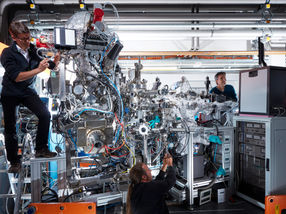Abgenix And Agensys Enter Technology License Collaboration To Discover And Develop Human Therapeutic Antibodies Against Cancer
Advertisement
Abgenix, Inc. (Nasdaq: ABGX) and Agensys, Inc., a privately-held biotechnology company, announced today a research collaboration, option and license agreement under which the parties will use Abgenix’s human antibody technologies to discover and develop fully human monoclonal antibody therapies against selected cancer antigen targets supplied by Agensys. Agensys’ proprietary portfolio of cancer antigens includes antigens associated with prostate, kidney, bladder, lung, colon and ovarian cancers.
Under the terms of the multi-product agreement, Agensys has option rights to obtain exclusive product licenses for up to 25 antigen targets during the collaboration’s five-year term. For each selected antigen, Abgenix will receive research license payments, and could receive additional fees and milestone payments, as well as royalties on any future product sales by Agensys. Agensys will be responsible for product development, manufacturing, and commercialization of any products developed through the collaboration.
"We are excited to enter this alliance with Agensys to generate fully human antibody candidates to their large portfolio of novel, clinically relevant cancer antigens," stated R. Scott Greer, chairman and chief executive officer of Abgenix. "This collaboration demonstrates our ongoing efforts in offering cancer patients new treatment options."
"Agensys’ alliance with Abgenix will allow us to drive forward the development of numerous antibody products based on our proprietary cancer antigens," said Donald B. Rice, chief executive officer of Agensys. "We’re most pleased to collaborate with Abgenix and its top notch technology for making fully human antibodies."
Antibodies are naturally occurring proteins used by the body’s immune system to combat many diseases. As therapeutic products, antibodies have several potential advantages over other therapies. The highly specific interaction between an antibody and its target may, for example, reduce unwanted side effects that may occur with other therapies. Fully human antibodies are desirable because they avoid the risk of rejection present with mouse or partial mouse antibodies.
Most read news
Other news from the department science

Get the chemical industry in your inbox
By submitting this form you agree that LUMITOS AG will send you the newsletter(s) selected above by email. Your data will not be passed on to third parties. Your data will be stored and processed in accordance with our data protection regulations. LUMITOS may contact you by email for the purpose of advertising or market and opinion surveys. You can revoke your consent at any time without giving reasons to LUMITOS AG, Ernst-Augustin-Str. 2, 12489 Berlin, Germany or by e-mail at revoke@lumitos.com with effect for the future. In addition, each email contains a link to unsubscribe from the corresponding newsletter.
































































